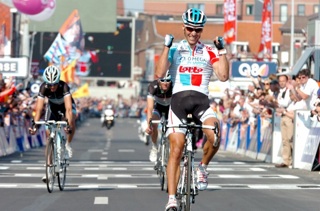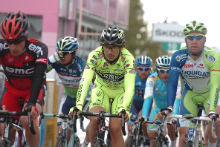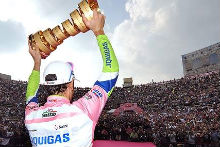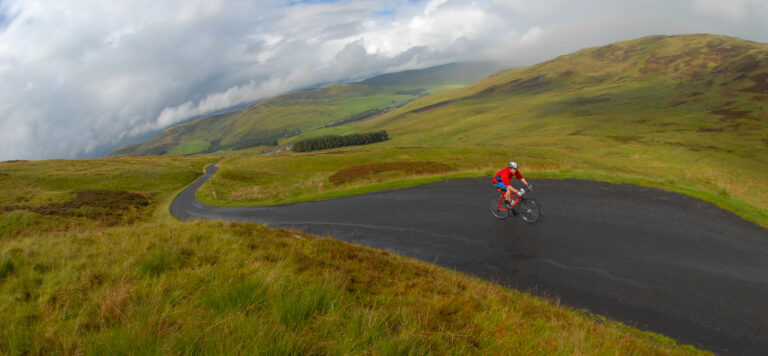In parts one and two, we looked at the types of continental events, the riders, teams involved and hopefully started to give an idea of what to expect.

This article will expand on how to train and plan for these events, plus give a selection of events to ride.
When we planned this series of articles, RCUK suggested we should talk about our own target events for 2012 and the preparation involved. Through our own team (website link at the foot of the article), we are targeting the Tour du Mont Blanc in July, Le Velomediane in August, and La Dromoise in September. A number of events will fit around these, as part of a training program which will usually involve a week’s training in the mountains.
These will include the Liege-Bastogne-Liege cyclo on the April 21 with a 271km route and 4788m of iconic and very tough climbing in the Belgian Ardenne – not a sportive but a great day’s training with four hill climb time trials and the chance to watch one of the world’s toughest classic races the next day.
Le Challenge Vercors on the May 27 which is 170km with 3,380m of climbing. This is in the Vercors Alps to the South of Grenoble and is regarded by many as the first proper mountain sportive of the season. It attracts a top field and is an extremely good race. Last year’s race was run in stunning conditions but marred by several very serious crashes. Better luck this time hopefully!
On June 16, we’ll ride L’Ardechoise Velo Marathon in the Ardeche mountain region in the South East of the Massif Central. This is 278km with 14 cols and 5,310m of climbing. It’s billed as Europe’s toughest sportive, but clearly they decided to overlook the Tour du Mont Blanc! In between these, we’ll time trial and maybe ride the odd road race.
Training to get a top place takes a huge commitment. Many of the guys at the front and on the podium are riding 20-30,000km a year and have very specific training programs. Do remember these riders frequently are paid. Any continental magazine will offer lots of advice on training programs, and these usually start from around 10 hours per week. They all include distance work for stamina, intervals and speed work, varying intensities and recovery. Ultimately, any programme can be tailored to each individual’s goals and the available time. Many people use a coach and we know a few we can happily recommend.
A common theme in any training programme is to have a training camp in similar terrain to your target event. Lots of people go to the mountains to prepare for events like L’Etape and La Marmotte, which makes perfect sense. We tend to train a lot in the Belgian Ardenne, as it’s only thre hours from Calais and has climbs of up to just under 700m – there are even ski lifts and downhill runs! This is a stunning area, full of cyclists, clubs and teams which makes a great atmosphere. Factor in the chance to train in the hilliest part of Belgium which is home to the Liege-Bastogne-Liege race and you can see the reason. We have already done one five-day training camp in the Ardenne so far this year and have other trips scheduled.
For those with more time to travel, training in the Vercors region of the Rhone Alps is hard to beat. This gives access to the large Alpine cols, plus ‘smaller’ cols of circa 1,100m, but more importantly allows you to mix in flat rides in the Rhone valley and really get the most from your weeks training. We stay with Roger and Teresa at Velovercors.com and cannot recommend them highly enough – well worth the trip! We frequently take groups to both areas and would be happy to offer advice.
Many people will not be able to get away until the event and will focus on UK training. There is fantastic training terrain in the UK and with the correct focus on UK sportives worked into your training schedule, this is not a problem. In addition, to get the desired level of speed needed to race at the front of a Continental Sportive, you could include road racing (which will certainly help with bunch riding and the changes in speed) and time trials. The latter are actually very good for helping with the mental and physical effort of climbing mountains.
There is a lot to take into account, hence if you want to do well having a coach is a major benefit. Plan your training and stick to your plan, but be realistic!
Equipment and gearing will be a very large topic to cover and we’ll focus more on this in later articles. However, the most important thing is the correct fit to ensure you’re in the most comfortable and efficient position.
You’ll see a lot of very high end bikes at European events (a typical top-end Belgian bike is shown above) and there’s no point in spending a fortune on top end components unless they’re set up specifically for you and your event. It’s amazing how many people buy very expensive bikes and then spend the whole ride in pain because it’s the wrong size or their position is wrong, not to mention how much effort is being wasted! Spending time in this area is vital. We help a huge number of riders get this right. They get the most from themselves and their bike and go for a high placing in the race.
Nutrition is another huge topic and taking enough to cover the event is vital. There are feed stations, but the front bunches never stop (many riders and teams have back-up throughout with a team car and spare bikes etc), so if you want to race the event unsupported, you need to know you can cope with the distance, speed and terrain. Experimenting during training and non-target events is the best way to learn how your body copes and what you’ll need. You may be able to carry enough food and gels and take a 30 second pit-stop at a feed station just to refill bottles and put into an electrolyte tablet or take a salt capsule. It’s been mentioned many times before, but if you want a top place, race at the front (or at least at the front of your bunch), so you can stay out of harm’s way and can react to whatever happens. Ultimately though, it’s your personal challenge to give you a great sense of achievement, whatever your goal.
In part four, we’ll look further into equipment and how to get to your event.
About the author:
Andrew Thompson started racing in 1983 and has competed in road and off-road events, both in the UK and in Europe. He is a director of Cicli di Tomsoni Ltd, the UK importers of A:xus bikes from Germany and Thompson Bikes from Belgium.





